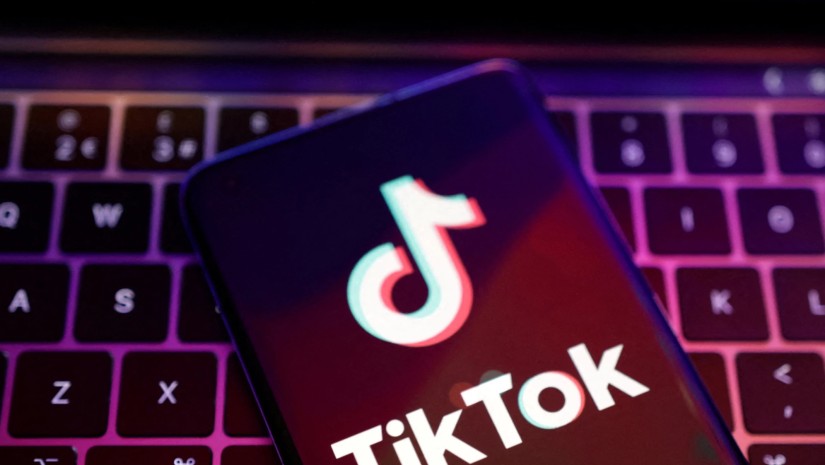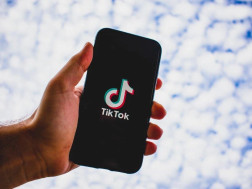China has attacked a bill going through US Congress that could ultimately see TikTok banned in the States, calling it unjust.
It is the latest move in a years-long row over safety fears about the app which is owned by a Chinese company.
Officials, politicians and security staff in many Western countries have been banned from installing it on work phones.
So what are the three biggest cyber concerns about TikTok, and how does the company respond to them?
1. TikTok collects an 'excessive' amount of data
Critics frequently accuse TikTok of harvesting huge amounts of data. A cyber-security report published in July 2022 by researchers at Internet 2.0, an Australian cyber-company, is often cited as evidence.
Researchers studied the app's source code and reported it carries out "excessive data harvesting". Analysts said TikTok collects details such as location, what specific device is being used and which other apps are on it.
However, a similar test carried out by Citizen Lab concluded "in comparison to other popular social media platforms, TikTok collects similar types of data to track user behaviour".
Similarly, a report by the Georgia Institute of Technology last year stated: "The key fact here is that most other social media and mobile apps do the same things."
2. TikTok could be used by the Chinese government to spy on users
TikTok says the company is fully independent and "has not provided user data to the Chinese government, nor would we if asked".
Although it irks privacy experts, most of us accept that handing over swathes of private data is the deal we make with social networks.
In exchange for giving us their services free of charge they gather knowledge about us and use it to sell advertising on their platform, or sell our data to other firms trying to advertise to us elsewhere on the internet.
The issue that critics have with TikTok is that it is owned by Beijing-based tech giant ByteDance, making it unique as a non-American mainstream app. Facebook, Instagram, Snapchat and YouTube, for example, all collect similar amounts of data but are all US-founded companies.
For years, US lawmakers, along with most of the rest of the world, have assumed a level of trust: that the data collected by these platforms will not be used for nefarious reasons which might put national security at risk.
Donald Trump's 2020 executive order alleged TikTok's data collection could potentially allow China to "track the locations of federal employees and contractors, build dossiers of personal information for blackmail, and conduct corporate espionage".
So far, evidence points to this being only a theoretical risk - but fears are stoked by a vague piece of Chinese law passed in 2017.
Article seven of China's National Intelligence Law states that all Chinese organisations and citizens should "support, assist and co-operate" with the country's intelligence efforts.
This sentence is often cited by people suspicious not just of TikTok, but all Chinese companies.
However, researchers from the Georgia Institute of Technology argue this sentence is taken out of context, and note that the law also includes caveats protecting the rights of users and private companies.
Since 2020, TikTok executives have repeatedly tried to reassure people that Chinese staff cannot access the data of non-Chinese users.
But in 2022, ByteDance admitted that several of its Beijing-based employees did access the data of at least two journalists in the US and UK to track their locations and check whether they were meeting TikTok employees suspected of leaking information to the media.
TikTok's spokeswoman says the employees who accessed the data were dismissed.
The firm insists user data has never been stored in China and is building data centres in Texas for US user data, and at sites in Europe for data from its citizens.
In the EU the company has also gone much further than any other social network and enlisted an independent cyber-security company to oversee all use of data at its European sites. TikTok says "data of our European users is safeguarded in a specially designed protective environment, and can only be accessed by approved employees subject to strict independent oversight and verification."
3. TikTok could be used as a 'brainwashing' tool
TikTok argues that its community guidelines "prohibit misinformation that could cause harm to our community or the larger public, which includes engaging in co-ordinated inauthentic behaviour".
In November 2022, Christopher Wray, director of the Federal Bureau of Investigation, told US lawmakers: "The Chinese government could… control the recommendation algorithm, which could be used for influence operations." The claim has been repeated many times.
Those concerns are further inflamed by the fact that TikTok's sister app, Douyin - which is only available in China - is heavily censored and reportedly engineered to encourage educational and wholesome material to go viral for its young user base.
All social networks are heavily censored in China, with an army of internet police deleting content which criticises the government or excites political unrest.
At the start of TikTok's ascendancy, there were high-profile cases of censorship on the app: a user in the US had her account suspended for discussing Beijing's treatment of Muslims in Xinjiang. After a fierce public backlash, TikTok apologised and reinstated the account.
Since then there have been few cases of censorship, other than the sort of controversial moderation decisions with which all platforms have to deal.
Researchers at Citizen Lab carried out a comparison of TikTok and Douyin. They concluded that TikTok does not employ the same political censorship.
"The platform does not enforce obvious post censorship," researchers said in 2021.
Georgia Institute of Technology analysts also searched for topics such as the independence of Taiwan or jokes about Chinese Premier Xi Jinping, and concluded: "Videos in all of these categories can easily be found on TikTok. Many are popular and widely shared."
Theoretical risk
The overall picture, then, is one of theoretical fears - and theoretical risk.
Critics argue TikTok is a "Trojan horse" - although it looks harmless, it could prove to be a powerful weapon during times of conflict, for example.
The app is already banned in India, which took action in 2020 against the app and dozens of other Chinese platforms.
But a US ban on TikTok could have a huge impact on the platform, since typically US allies often fall in step with such decisions.
That was apparent when the US successfully led calls to block Chinese telecom giant Huawei from being deployed in 5G infrastructure - again, based on theoretical risks.
It is worth noting, of course, that these risks are a one-way street. China does not have to worry about US apps because access for Chinese citizens has been blocked for many years.
Source: BBC
















